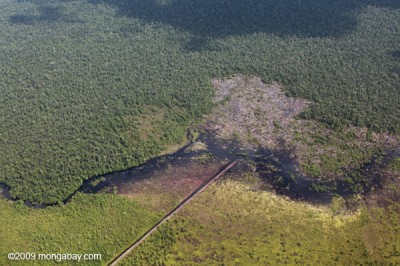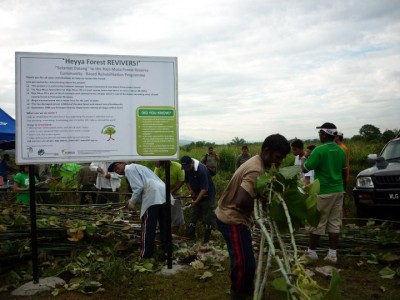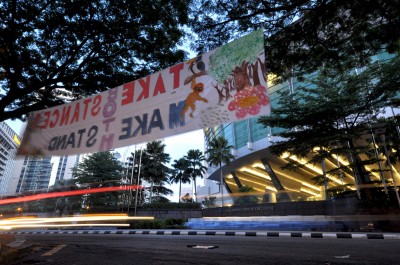A consideration on the palm oil industry’s service and disservice to humankind and our duty in finding that balance between development and sustainability.

Last week on LoyarBurok, I read Heroes of the Palm Oil Milling Industry by Jonathan Fun, capturing the stories of ordinary workers in the palm oil milling industry – an industry that produces the raw materials for many of our day to day consumables. A heart warming story reminding us the people who sacrifice their sweat, blood, and youth to feed the world, their country, and their family.
Jonathan was right in pointing out that the palm oil industry is working on borrowed land. The process of a sector growing to be the major employer of a country is often at the expense of the local resources and ecosystem. While the palm oil industry provides employment to more close to a million people (or maybe more), we must not forget in the process of doing so, the oil palm industry has displace countless local communities, and is still continuing to do so.
As land in the Peninsular became scarcer, the search for new land for oil palm plantations moved to East Malaysia, one of the highest bio-diversified regions. In the state of Sarawak alone, the total planted area covers more than 830,000ha. Over the years, there are countless reports of indigenous communities displaced by oil palm plantations.
Also important to note, is that many of these plantations were controversially planted on cleared peat forest – a very fragile land which acts as an important carbon sink. Peat land is easily available, especially in Sarawak, but the clearing of forests and draining of the peat soil releases the stored organic carbon into the atmosphere.


While Jonathan mentioned the like of Roundtable of Sustainable Palm Oil (RSPO) which was set up to ensure sustainable practices being implemented across the industry, one must not discount the fact the implementation is far more complicated that it sounds. Since its establishment in 2002, only 1.5 million tonnes of the annual global production of 45 million tonnes of palm oil were certified by the RSPO. Malaysian and Indonesian plantations have been criticising RSPO for being too restrictive and argue that the RSPO certified palm oil take up by western consumers is disappointing. Plantations from both the countries have threatened to pull out from RSPO, with Indonesian delegates walked out from the 6th General Assembly of RSPO in Bali, 2008.
The point is, RSPO is far more complicated than we all know, because the world is addicted to cheap and unsustainable practices. Furthermore RSPO’s credibility has come under attack.

Self regulation among the plantations may be the answer towards a more sustainable palm oil industry. For example, Kulim (M) Bhd has set up joint patrol with Wildlife Conservation Society near the Endau-Rompin Park as part of tiger conservation effort. Some other plantations, and mills, for both financial and environmental reasons, have voluntarily adopted measures, such as setting up palm waste biomass facilities, to reduce carbon emissions.
The question is how many plantations are willing to self regulate and will it be too late by the time we have most of them onboard?
As Jonathan has reminded us, the next time you eat a biscuit, a piece of chocolate, or when you spread margarine onto your bread, think about the sacrifices of these great men and women who have worked so hard in order to keep our stomachs full. We must also be mindful of the social and environmental impact of these foods we are consuming.
Every industry creates jobs and feed stomach but it is always in the expense of the local ecosystem, the question is how to balance both.
I would venture say that mankind has yet to find an answer to that… but we can make difference if we keep trying in every little way we can, one day at a time.
Leong ChowPong sells black in the day and turns green at night; “I fade in and out of existence; and I walk both world, to deliver the message in completeness.”

Good comment by Jonathan, pointing the way forward for Malaysia’s Oil Palm industry, in view of the land constraint and also labour shortage, is to increase productivity.
Peatland is abundant and easily accessible in Malaysia, but the yield from peatland is lower. However due to land constrain, many acres of peatland were drained, and replanted with oil palms, especially in Sarawak. This has been the practice for local palm players for decades…
Of course, for financial and environmental benefits, EFP & POME are both beginning to be used for power generation within the refinery. We could just hope there will be more takeups for these CDM projects by the mills.
Things are definitely improving, however we as users must exert more pressure to expedite this improvement.
cP
Gentlemen,
Do not frown in pessimism just yet, as today more and more corporations as well as the government are actively jumping onto the bandwagon towards total sustainable production of palm oil.
I shall share some points below about some developments in Malaysia so that we won’t be “blindly conforming or opposing” Chow Pong’s remarks.
With regards to environmental conservation:
The way forward for Malaysia’s Oil Palm industry, in view of the land constraint and also labour shortage, is to increase productivity (ie: through development of better planting materials that will increase the yield with the same amount of land), and to revitalize the industry through modernization and commercialization of the small-holder sector. These efforts have been put into action for some time now.
Under the 6th Malaysia Plan for instance, in situ developments involving land consolidation, rehabilitation, replanting, drainage and flood mitigation were given priority while new land development was omitted. Under the 7th Malaysia Plan, almost 400,000 hectares of land was replanted, consolidated and rehabilitated. And under the 8th Malaysia Plan, 1 million hectares of land have been identified for this exercise.
Over the years, Malaysia’s palm oil industry has also developed and adopted many sustainable practices in the cultivation, production and refining of palm oil. An example I can immediately cite, is the zero burning technique, where felled palms during the replanting process will be chipped and windrow-stacked to allow biodegradation to take place and allow the nutrients of the palms to return to the soil. IPM (Integrated Pest Management) systems have also been adopted by many major players today to reduce reliance on pesticides by cultivating beneficial plants and barn owls to control pests like bagworms and rats.
In recent years also, we have seen the bars raised in areas with regards to the treatment POME (Palm Oil Mill Effluents), and the DOE (Department of Environment) have recently imposed very strict regulations to only allow treated effluents of BOD (Biology Oxigen Demands) of as low as 20ppm to be discharged to watercourses. In certain areas closer to civilization, zero discharge is mandatory and only land application of POME with BOD of less than 5000ppm is allowed. Many have also adopted the approach of mixing POME with EFB (Empty Fruit Bunches), another waste from the palm oil mills, to produce compost, which can be used as fertilizers for oil palms and even other plants.
Apart from the RSPO, the industry in Malaysia has also been active in the development of the ISO14000 series of the international environment management standard under the ISO Technical Committee 2007. The MPOB (Malaysia Palm Oil Board) as well as the Malaysian Palm Oil Council (MPOC) have also been actively raising awareness on the relevance of these standards and the need for the industry player’s adoption through various seminars/workshops like POMREQ (Palm Oil Milling, Refining and Environment Quality) seminar, the one I attended recently in Kota Kinabalu, Sabah.
We must admit, that the rate of adoption have been slow at first, but in recent years we have seen an increasing number of mills/estates/refineries being certified and many more others who are working hard towards certification. In fact, the company in question through one of the links to Chow Pong’s post have also pledged to have all their 12 palm oil mills in Malaysia to be certified by the end of 2011; As of 2010, 3 out of 4 mills in peninsular Malaysia have been officially certified by bodies like BSi, SGS, Control Union and Sirim, while 4 out of 8 mills in Sabah have been certified. This is clearly an indicator of the commitments of more and more big players towards the sustainable production of palm oil.
Contrary to certain quarter’s claims that Malaysia doesn’t have proper system to protect the interests of the workers working in this industry (with regards to workers welfare, health and compensation), there are legislations in Malaysia to ensure efficient management of labour matters for local industry players. Here’s a few I know, and support:
1. Worker’s Minimum Standards of House and Amenities Act 1990 (Act 446)
This is a unique feature of the Malaysian plantation sector, where it is a mandatory requirement of employers to provide basic necessities, eg: shelter, water, electricity, medical and other amenities, to workers and their dependents (enshrined in the Workers’ Minimum Standards of Housing and Amenities Act 1990). Jurisdiction of this stature also covers land holdings up to 20 hectares, hence individual land owners are not spared from this act.
Unfortunately the employer’s financial contribution towards the compliance to this law was underestimated by the public at large. Miles of roads and span of bridges that have been built by the industry players over the years, helping to connect the rural areas all over the country, actually complements the government’s efforts in providing basic infrastructure to the needy. There are many estate clinics in remote locations in Sabah and Sarawak providing basic medical assistance to the natives and local communities where government clinics are non-existent.
This law also ensures that industry players set aside land and allow workers to plant vegetables and raise poultry for their own consumption. In essence, employers are required to sacrifice some productive land for the benefit of their workers for free, despite having need to pay quit rent of these lands.
2. Employment Act 1955 (Act 265)
All manual and non-manual workers earning less than RM1500 a month are ensured benefits and rights including working hours, annual leave, public holidays, overtime rates, sick leaves, as well as termination and retrenchment. It was amended in 1998 to make way for employees who earn RM5000 a month and below to complain to the Labour Department for any violation in the part of the employer of any terms and conditions of the worker’s contract of service.
3. Workers in the State of Sabah and Sarawak on the other hand, are governed by Labour Ordinance of Sabah (Amendment) Act 2005, Labour Ordinance of Sarawak (Amendment) Act 2005 as well as the Federal laws. This two separate laws are enacted to safeguard the recognize the interests of this two states when they joined Malaysia in 1963. Eg: Malaysians from peninsular will need a work permit to work in Sabah and Sarawak.
4. Industrial Relations Act 1967 (Act 177) and Trade Unions Act 1959
These are social legislations that govern the relationship between employers and employees and their trade unions, resulting in the practice of collective agreements between MAPA (Malayan Agricultural Product Association) representing the employers and NUPW (National Union of Plantation Workers) representing the employees where the concept of PLWS (Productivity Linked Wage System) is generally applied.
5. Workmen’s Compensation Act 1952 (Act 273)
This is to ensure compensation to workers if they suffer injury in the course of their employment. Even the foreign workers are covered under Workmen’s Compensation (Foreign Workers’ Compensation Scheme) (Insurance) Order 2004 as well.
Conclusion
In my opinion, the journey towards the betterment of mankind as said by Chow Pong can be only be achieved if the players, public and government work hand in hand towards this common goal. Self regulation definite helps to improve the current situation, but it may not be enough in the long run.
In the case of the oil palm industry, first, the public (consumer) pressure must continue be there to “force” players to change their ways and adopt sustainable practices. A recent news that the Dutch government will now only buy sustainable palm oil is a result of such pressures. Eventually more governments will follow and this will help increase the demand for sustainable palm oil.
Second, the industry players themselves must come to the realization that adopting sustainable practices will not only help save the environment and provide their people better lives, but it will also be profitable to do so as more and more buyers are willing to pay premiums to buy sustainable palm oil.
Finally, the government must continue enact, amend, and enforce strict and fair regulations to regulate this industry according to changing times, so that the rights of the employers and workers are protected, and disputes/issues arising therefrom can be resolved.
Moving forward, is this journey going to be easy? No. But is the goal achievable in the long run? Definitely Yes.
The only differential is Time. And the catalyst to shorten this is Us.
Things are definitely improving, and we must remain optimistic.
Cheers,
Jonathan
@Jon, @kuru : the world will not be better if we blindly conform or oppose. Be informed, that how we know how to debate, for the betterment of mankind.
@samuel, @IsayNo2ISA : logging, commercial agri (such as palm) have long been major cause for deforestation, at the same time it has been revenue generator for many nations which lifted the poverty level (despite the fact misuse of funds/mismanagement/corruption).
The key is how to do everything sustainably, proper EIA, DEIA, and even Social Impact assessment…. All must be in place. Malaysia has not a proper process yet, thus up to us, users to put pressure to the producers & authority.
Buy from certified RSPO producers, SFC certified wood products.
Cheer
cP
@chowpong
We Malaysians have never stopped to ponder on this:
Oil Palm was a wild tree species found in the Amazon forest of Brazil. The Brazilians found this treasure from their forest and it spread to the world. Whereas, we are busy chopping down our forest rather than endeavor to find what hidden treasure there might be in our forest.
Instead of learning from the natives or orang asal living in the forest, we chase them out and cut down their trees so that we could plant the treasures found in Amazon Forest from Brazil.
We are killing the goose that will lay a golden egg for us and we are too short sighted to see it.
There is hundreds of species of flora and fauna being chopped down and burn off at this very moment while I'm typing this. A plant that might hold secret of cancer cure, or a super fruits that hole the secret to longevity may have gone extinct.
Think about it people.
FROM LOGGING TO OIL PALM
First it was deforestation for timber
Now it's land clearing for oil palm
With limited replanting to replace lumber
Those being deprived told to remain calm
(C) Samuel Goh Kim Eng – 051110
http://MotivationInMotion.blogspot.com
Fri. 5th Nov.2010.
This is so cool. LoyarBurokkers discussing points as it should be – rationally and with the same passion required to be an activist.
And for site to allow free exhange of views publishing writings where one may disagree with another – wow!
Thanks Jonathan & ChowPong.
Chow Pong has given some great realistic points to the current situation of the Oil Palm industry in general.
Despite that the road towards total sustainable production of Palm Oil is still a long way, I would positively vouch that today, more and more people in and outside the industry are gradually being made aware of its significance, and hopefully, with more awareness being done and steps being taken by every quarter of the supply chain day by day, we can soon see a huge leap towards being able to feed the world, and preserve mother earth.
Cheers Chow Pong!